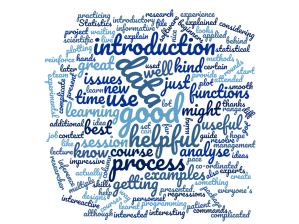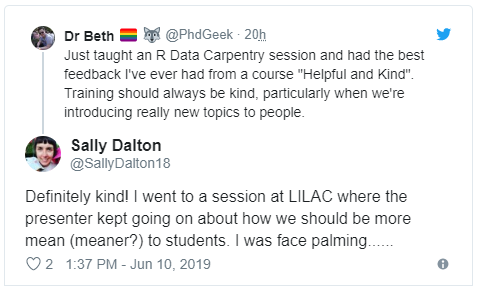I headed up to Glasgow nice and early yesterday, not as early as I’d normally leave for London, so that was a good start! Easy trains, beautiful countryside and the rain the the UKSG twitter account had teased earlier in the day was all gone by the time I arrived.

After a quick bit of shopping (Glasgow actually still has bricks and mortar high street shops – I went to an HMV!), I headed to the hotel. Best conference hotel check in I’ve ever had – all the keys were laid out with names and room numbers attached, no need to queue to talk to someone. Definitely a step up from when I stayed at the same hotel 10 years ago for a population genetics conference where it had turned out the University had only reserved my room, not paid for it, and I needed to pony up with all the non existent cash in my postdoc bank account.
Last night was the First Timer’s reception in a really great building called the Rotunda – very cool painting ceiling which I completely forgot to take a photo of. I couldn’t find a photo with a re-use license, but if you head here you can see someone else’s photo. Excellent drinks and conversations were flowing, and I met quite a few people in real life who had previously just been twitter and linkedin avatars in my head.
In particular I had a great chat with Matt Hodgkinson from UKRIO, talking all things publishing and research integrity. Matt’s giving a workshop in one of the breakout sessions and I’d really recommend you go. Anyone who heard my RLUK talk earlier in the year will know that I really think this is a break out area for librarians – our skills fit so well for supporting researchers in this space.
If you’d like to find out more about research integrity (after attending the workshop this week), there’s a conference hosted by UKRIO in May and tickets are still available here: https://www.eventbrite.co.uk/e/ukrio-annual-virtual-conference-2023-registration-524623050667
Well, I’m off to breakfast now and to start day 1 properly, but I’ll leave you with a picture I took just outside of my hotel earlier this morning.

@Beth Montague-Hellen 2023 CC BY 4.0
 Those of us who teach from the professional services face an uphill battle in getting people to sign up to and then turn up to the courses that we run.
Those of us who teach from the professional services face an uphill battle in getting people to sign up to and then turn up to the courses that we run.
